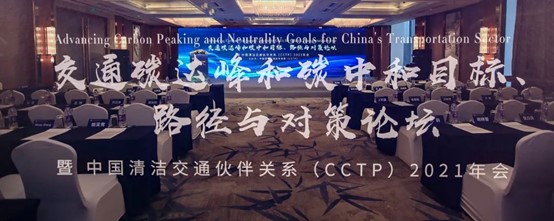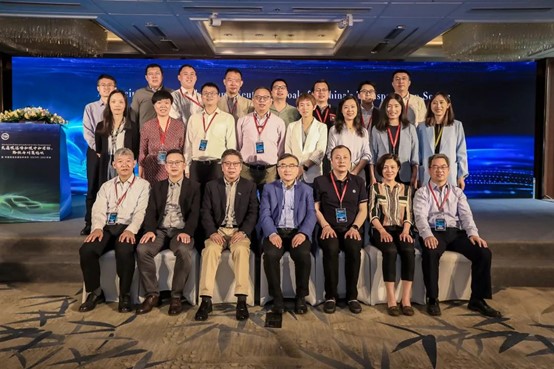
On May 27, 2021, the China Clean Transportation Partnership (CCTP) Annual Forum on "Carbon Peak and Carbon Neutrality Targets, Pathways, and Countermeasures Forum" was successfully held in Beijing. Twenty-four renowned experts in the fields of climate, energy, transportation, and environment, including, Zou Ji, CEO and China President of the Energy Foundation China, Yin Hang, deputy director of Vehicle Emission Control Center, Chinese Research Academy of Environment Sciences, Wu Zhixin, deputy general manager of the China Automotive Technology and Research Center Co. Ltd, He Hui, China program director and senior researcher of the International Council on Clean Transportation, attended the forum and delivered keynote speeches.
Approximately 120 participants from universities, research institutes, international organizations, think tanks, companies, and media attended the offline forum, with around 32,000 people watching the live broadcast on Weibo. The forum was hosted and summarized by Gong Huiming, the senior program director of transportation program, Energy Foundation China.
Over the past nine years, the annual average growth rate of carbon emissions in China's transportation sector has remained above 5%, making it one of the fastest-growing sources of greenhouse gas emissions. As of 2020, the total number of motor vehicles in China reached 372 million, including 281 million cars. When combined with aviation, railways, water transport, and others, the carbon emissions in the transportation sector are significant. With the introduction of the goal to “strive for carbon dioxide emissions to peak by 2030 and achieve carbon neutrality by 2060”, as emphasized during the Central Economic Work Conference in December 2020, achieving carbon peak and carbon neutrality in the transportation industry is of paramount importance to meet air quality standards, protect human health, achieve national climate change goals, and promote the implementation of carbon peak and neutrality targets.
In the opening remarks, Zou Ji highlighted that the transportation sector has gradually become a major source of air pollution in many cities and a significant contributor to greenhouse gas emissions. Achieving zero emissions in the transportation sector is crucial for meeting air quality standards, protecting human health, realizing national climate change goals, and promoting the implementation of carbon peak and neutrality targets.
Zou Ji stated that the Energy Foundation China's goal is to promote the transportation industry to achieve carbon peak around 2025, comprehensive electrification of road transportation by around 2035, and carbon neutrality in road transportation before 2050. In addition, the transportation industry aims to reduce carbon emissions by 75% and pollutant emissions by 90% based on the levels in 2015. Key pillars for achieving peak and neutrality include energy efficiency standards, transportation structure optimization, and electrification.
Dr. An Feng, executive director of the Innovation Center for Energy and Transportation, mentioned in his speech that, according to iCET's forecast in the timeline for the phase-out of traditional fuel vehicles, petroleum consumption in motor vehicles is expected to peak before 2025 and decrease to 55% by 2040. By 2050, greenhouse gas emissions from motor vehicles can be reduced by 77%.
Yin Hang, pointed out that with the implementation of policies and plans such as fuel consumption standards and the promotion of new energy vehicles in recent years, the transportation sector is expected to reach its carbon peak between 2028 and 2030. However, achieving carbon neutrality in the transportation sector by 2060 will be a significant challenge without stricter decarbonization policies. China needs to consider long-term strategies and implement more stringent policies and measures to reduce carbon emissions in the transportation sector, thereby contributing to the achievement of the country's 2060 carbon neutrality goal.
He Hui, highlighted in her speech that, according to ICCT's 2050 outlook study, by following five strategic paths, including vehicle energy efficiency and CO2 emission regulations, zero-emission vehicle policies and regulations, tailpipe emission standards, low-carbon renewable fuel regulations, and transportation demand management, the transport sector can achieve an 80% reduction in CO2 equivalent emissions globally by 2050, which brings emissions very close to the required level of 2.6 billion tons for 1.5-degree climate control.
Wu Zhixin, stated that accelerating the development of intelligent new energy vehicles is an important technological path and strategic choice for the automotive industry to achieve its "dual carbon" goals. At the same time, the automotive industry should also focus on energy-saving and low-carbon measures for traditional energy vehicles throughout the entire value chain of automobile manufacturing. However, achieving the "dual carbon" goals in the automotive industry cannot rely solely on the industry itself but requires coordinated development and integration with the broader energy and transportation sectors, such as the integration of connected vehicles, power grid systems, and smart transportation networks, which can systematically improve energy utilization and transportation efficiency and thereby comprehensively reduce carbon emissions. Additionally, promoting a green lifestyle and reducing "unnecessary travel" are also necessary.
The forum featured three main thematic forums.
The first forum discussed the "Carbon Peak and Carbon Neutrality Targets and Pathways in Different Transportation Sectors," exploring the development strategies and pathways for achieving carbon peak and carbon neutrality in civil aviation, water transport, railways, and urban road transportation. This session was chaired by Yin Hang, with keynote speeches delivered by Lü Jixing, Assistant Researcher at the Civil Aviation University of China, Peng Chuansheng, Chief Researcher at the Waterborne Transport Research Institute of the Ministry of Transport, Zhou Xinjun, Researcher at China Academy of Railway Sciences Co., Ltd. and Editor-in-Chief of "China Railway Science," Liu Shengqiang, Chief Engineer at the Environmental Department of the Transport Planning and Research Institute, Ministry of Transport, and Chen Xumei, Director of the Policy and Standards Research Office at the Urban Transportation and Rail Transportation Research Center of the China Academy of Transportation Sciences,Ministry of Transport.
The second forum focused on the "Key Issues and Policy Safeguards for Carbon Peak and Carbon Neutrality in Road Transportation." It was moderated by Zhang Xuming, deputy secretary-general of the China Society of Automotive Engineers, and featured speeches by Wang Yunshi, director of the China Center for Energy and Transportation at the University of California, Davis (online), Ou Xunmin, associate professor and researcher at the Institute of Energy, Environment, and Economy at Tsinghua University, Zhao Dongchang, deputy chief engineer at China Automotive Technology and Research Center Data Co., Ltd., Ren Huanhuan, director of the Low-Carbon Business Division at China Automotive Technology and Research Center Data Co., Ltd., Liu Bin, deputy director of the Policy Research Center at China Automotive Technology Research Center, Zheng Tianlei, director of the Energy Saving and New Energy Department at China Automotive Technology Research Center Standardization Institute, Qin Lanzhi, clean transportation project manager at the Innovation Center for Energy and Transportation and Li Lili, chief strategy officer and deputy director of the New Energy Vehicle Energy Storage Institute at Sichuan Energy Internet Research Institute Tsinghua University.
The third forum focused on the "Local Practices of Achieving Carbon Peak and Carbon Neutrality in Transportation." It was chaired by Wu Ye, vice dean of the School of Environment at Tsinghua University. Liu Daizong, the director of the Sustainable Urbanization Program at the World Resources Institute, Zhu Hong, the vice dean and professor-level senior engineer of the Shanghai Urban And Rural Construction And Traffic Development Academe, Hao Chunxiao, the deputy director of the Policy Research Department at the China Society of Automotive Engineers Vehicle Emission Control Center of Chinese Research Academy of Environmental Sciences, Wang Zhe, the traffic project director of the Rocky Mountain Institute, Wang Pinxi, the deputy director of the the Energy Conservation and Emission Reduction Center at the Beijing Transport Institute, and Wang Hewu, the deputy director of the China-US Clean Vehicles Alliance at Tsinghua University, introduced the low-carbon development experiences in the field of transportation in Chengdu, Shanghai, Hainan, Shenzhen, Beijing, and Zhangjiakou.
At the end of the forum, Gong Huiming summarized the expert speeches and proposed that, from the perspective of the national 30·60 dual-carbon target, the entire transportation industry should further clarify the calculation methods and emission reduction boundaries of transportation carbon emissions, as well as identify the most effective emission reduction measures and corresponding responsible entities. Based on existing research, the consensus among most studies is that carbon emissions in the transportation sector will peak before 2030 but achieving carbon neutrality in transportation will face very severe challenges.
Furthermore, he raised issues and directions worthy of future research and exploration. While current attention is on carbon emissions peaking, achieving carbon neutrality presents greater challenges requiring technological breakthroughs and clearer goals. In addition to meeting national targets, achieving early carbon neutrality in transportation will also be compelled by the pressure faced by the majority of countries internationally for carbon neutrality by 2050. The demand for passenger travel will continue to grow rapidly with economic development and increased income, while freight demand will face decreasing pressure due to reduced coal consumption and upgrading of industrial structures.
He stressed that achieving carbon neutrality in the transportation industry is not just about vehicles or transportation, but also involves transportation needs and infrastructure assurance (such as land use and urban planning, and power grid planning) and even building electricity capacity standards. In the future, he hopes that CCTP can play an important role in promoting collaborative efforts in research among more diverse institutions and industries.

CCTP is a non-governmental, non-profit, and voluntary platform, focusing on policy and technological innovations, summarizing and disseminating national and global practices for a net-zero transportation sector.